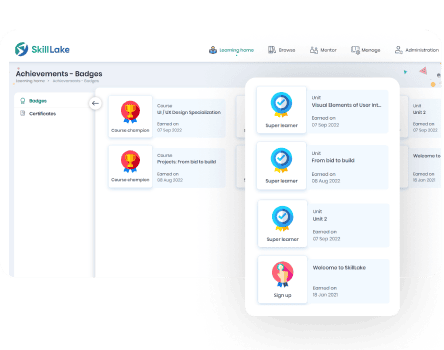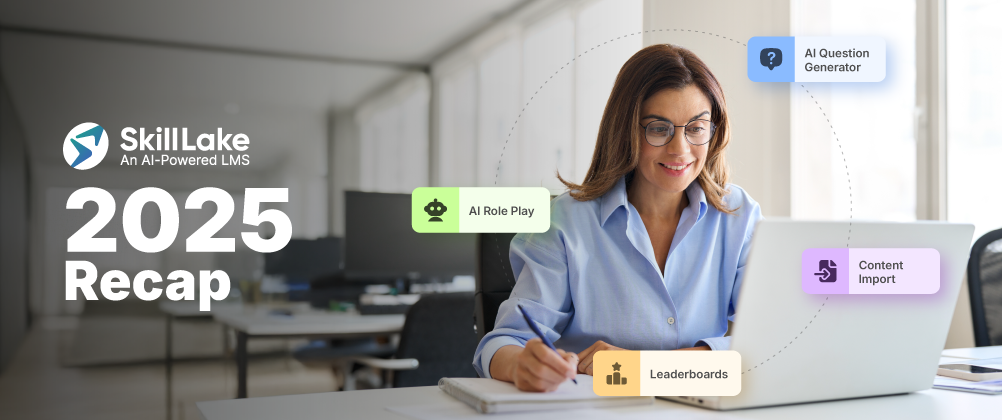AR VR in eLearning: Transforming Corporate Training for the Future

Online learning, also referred to as eLearning, has grown significantly in the recent decade as the internet and education have merged to give individuals the option to acquire new skills. In the wake of the COVID-19 pandemic, people’s lives have centered around online learning. The pandemic has prompted organizations to use remote working, which has increased online learning through learning management systems.
But what precisely is a Learning Management System? A Learning Management System (LMS) is a platform for tracking and managing employee training and development through self-directed learning, mandated training courses, or regular evaluations.
The Impact of AR VR in eLearning on the Corporate Learning Landscape
eLearning is a trend that is positively improving corporate training. Employees profit from eLearning to satisfy their training obligations. According to today’s savvy corporate managers and executives, online training is beneficial to businesses of all sizes and industries. Moreover, a new marketplace for eLearning tools is emerging. Corporate leaders have started grasping that instead of creating courses that need page-turning, they must provide ‘learning on demand’ – comprising methods for delivering adaptive, online education, systems for assessing learning, and identifying skill gaps.
A rundown of the top trends that indicate the future of eLearning.
Learning in the flow
One of the predominant challenges of corporate training is translating training into practical work. Employees are on their own to apply what they learn in training to their tasks without a manager or mentor looking over their shoulder to provide guidance, which is where learning in the flow comes into play. Learning in the flow helps to provide information about a skill to employees in real-time on the job using AI, chatbots, and integrations with other systems.
Adaptive Learning
Adaptive learning is a type of training in which materials, exercises, projects, and assignments get adapted to the specific requirements of each student. In the context of eLearning, adaptive learning will be implemented by defined algorithms and assessments rather than possibly arbitrary decisions made by teachers. Adaptive learning will reach new heights in the coming years when it gets linked with artificial intelligence.
Social Learning
Social learning applies the fundamentals of human interaction and group dynamics to the present age of technology. Because of online forums and file-sharing platforms, digital collaboration has never been more productive and efficient. With social learning, colleagues can provide insight and assistance from anywhere.
Gamification
Gamification in eLearning is a new phenomenon that entails using gaming mechanics to engage the audience in the learning process. With gamification in LMS, 83% of workers are more motivated to complete their objectives. By 2025, revenue from game-based learning may increase to $28.8 billion worldwide.

Learning Analytics
Learning analytics is a crucial aspect that drives eLearning trends. Given the future of artificial intelligence, having actionable insights and understanding the components necessary to measure the performance of your learners is critical. The more knowledge you inherit, the better insights will be.
Microlearning
Tailor-made to individual skill requirements, microlearning provides a more agile and cost-effective approach to staff training. Thanks to the mobile revolution. More learners are turning to microlearning as their preferred mode. Microlearning will also enable students to choose and use courses relevant to their requirements. The student-driven approach boosts learner engagement and improves training and work efficiency.
Big Data
In the eLearning sector, big data gets generated when students enroll in an eLearning course or training module. Big data will have a significant influence on eLearning. First and foremost, it will influence by collecting and analyzing learner’s steps. It can be perceived if they make mistakes or are learning inadequately. Following this, one can propose improvements to rectify the situation as an aid. Learners’ demands are evolving, necessitating more individualized attention. eLearning will require a firm grasp of big data analytics to deliver a tailored learning environment.
As the eLearning market expands, it’s vital to pay close attention to these new changes – rethink your training programs and re-evaluate your strategy to account for the changing demands of your learners, particularly during times of uncertainty.
Read more: The Essential Guide to Choosing the Best LMS for Your Organization
How AR and VR in eLearning Platforms are Transforming Training
Artificial Intelligence has risen in the eLearning industry, just as it has in any other field.
The last five years have seen significant advances in VR and AR in LMS for training. Instructional designers can now create real-life and interactive learning experiences by incorporating virtual surroundings and circumstances into eLearning. A simulated office environment or job role scenarios now aid in developing real-world expertise for the workforce. Using virtual reality, they may also engage with what they encounter on the job, such as sales terminals, machines, and safety equipment.
Currently, AI is playing a critical role in gathering and analyzing data from LMS systems, such as learners’ strengths, shortcomings, interests, and competency. The learning paths of users may be studied and examined in great detail with the aid of AI. Corporations and large enterprises utilize AI to create voice-enabled bots to help search for content. It will make it easier for students to find the courses they want and enhance their learning experience.
Practical Ways for Using AR VR in eLearning
1. Enhanced Online Training Simulations
AR and VR are being used in online compliance safety training simulations, allowing learners to enter a virtual learning environment and interact with virtual components in real-life scenarios to avoid workplace accidents and injuries. For example, you can run a compliance safety scenario simulation and see how your learners perform.
2. Advanced Learning Analytics
Collecting data in eLearning has never been easy, thanks to AR/VR technology. It is now possible to track learners’ eye contact to determine their interest in the training program, assisting in courses that more accurately evaluate learner engagement and use it to create a learner-worthy course.
3. eLearning Assessments with Visual Feedback
VR technologies encourage the use of branching scenarios, online simulations, and other forms of assessment to improve evaluation. When your students miss a stage in a procedure, they may be shown how to do it right and repeat the exam later, leaving no space for uncertainties or misconceptions.
4. Immersive Gamification in eLearning Courses
Using AR and VR technology, your learners may earn tangible badges and awards and literally progress up leader boards, enabling learners to engage with points and badges and even touch them in their hands.
5. Customized Learning Paths
AR and VR can allow learners to walk down a learning path and engage with learning resources, allowing the learner to select courses and activities that focus on decision-making skills improvement.
These are just five of the various options for introducing AR and VR into eLearning. You can also choose from virtual walkthroughs of your workplace, interactive product demos, virtual case studies, problem-centric scenario-based learning, and more. While augmented and virtual reality may seem out of reach for many as of now. With recent advancements in AR and VR, these immersive learning experiences will be open to all. By 2030, VR and AR will be used to enhance 23 million jobs, resulting in a £1.4 trillion boost to the world economy.

Elevate eLearning to new heights with the right LMS
Choosing a suitable LMS allows the employer to document, track, administer, and deliver training courses for their employees at the appropriate time. In addition, it helps to grow a business’ learning culture and identify training needs.
Skill Lake is a one-of-a-kind LMS platform with all the tools you need to engage learners and foster a holistic learning culture. Our goal is to be a creative partner who recognizes demands and provides solutions and systems to assist corporations to new heights. Skill Lake provides clients with future concepts such as learning analytics, microlearning, and gamification. Our system has evolved to keep up with shifting trends and be interoperable with all the latest tech.
To know more about Skill Lake and its exclusive features, sign up now and discover how to lead your workforce into the future.
Build a culture of continuous learning with Skill Lake’s state-of-the-art people development platform. Give your employees professional training to help them excel in their job roles and propel your business to greater efficiency and success.
Start Today

Roshna R
Roshna is a passionate enthusiast of all things about learning and development. She has an innate flair for crafting thoughtful content and is inspiring eager minds on their learning journey.